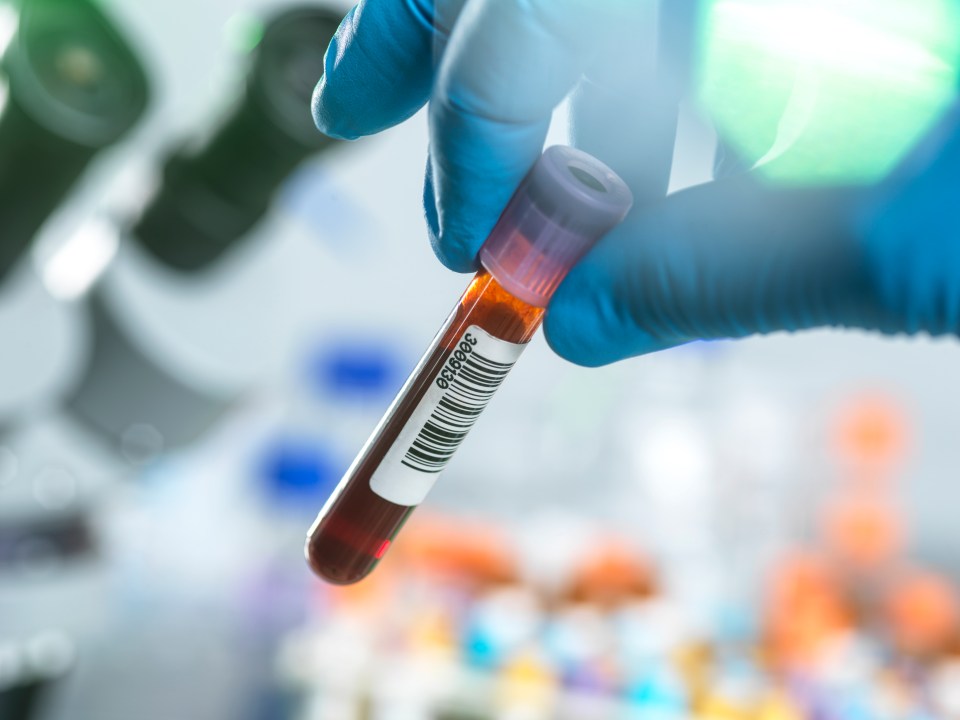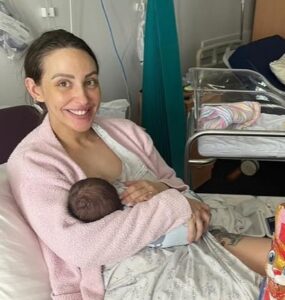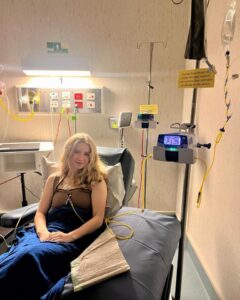A BLOOD test that can detect cancer before symptoms develop will be offered as part of an NHS trial, health officials have said.
Initial tests show the blood test can detect up to 12 common cancers – including bowel cancer – and has high sensitivity, with 99 per cent accuracy.
Health chiefs hope the scheme will improve survival rates by finding cancer “earlier, faster and cheaper”.
The miONCO-Dx blood test, developed by a team at the University of Southampton, uses AI to analyse blood samples for tiny fragments of genetic material from tumours to identify cancer present in the body.
Other common cancers it can detect include, lung, gastric, prostate, oesophageal, liver, bladder, ovarian, pancreatic and breast cancers as well as bone and soft tissue sarcoma and a type of brain tumour.
It was developed using data from 20,000 patients.
Read more on cancer
The technology is to be trialled in 8,000 patients thanks to a £2.4 million grant though the National Institute for Health and Care Research (NIHR) and the Government.
The Department of Health and Social Care (DHSC) said the development of the test has moved onto the next phase, the “verification and validation phase”, which will look at collating evidence to support the approval of the test for use in the NHS.
Health Secretary Wes Streeting, who had cancer himself in 2021, said: “We know that the key to surviving cancer is catching it as early as possible, so this government is taking the urgent action needed to make sure that happens through our plan for change, from developing world-leading technology to detect bowel cancer earlier, through to setting up hubs for the UK’s top scientists to research and treat the disease.
“And research is only one part of the work we’re doing. Our national cancer plan will transform cancer so patients can get the latest treatments and technology, ultimately bringing this country‘s cancer survival rates back up to some of the best in the world.”
Most read in Health
Speaking at an event to mark the renaming of a cancer lab in memory of the late Dame Deborah James, Mr Streeting said the work will help to bring England‘s cancer survival rates “back up to some of the best in the world”.
“Dame Deborah James dedicated her life to raising awareness for cancer and finding ways that we can beat it, so it is only right that we honour her legacy by investing in research to help stop one of the country’s biggest killers,” Mr Streeting said.
Dame Deborah died of bowel cancer aged 40 in 2022.
Officials from the Department of Health and Social Care (DHSC) said that the Bowelbabe Laboratory at the Francis Crick Institute in London, which is funded by Cancer Research UK, will bring together leading scientists and will conduct “cutting-edge” research.
The department also said patients, including those with bowel cancer, could soon benefit from the test.
Professor Sir Stephen Powis, NHS England’s national medical director, said: “This blood test has the potential to help us detect bowel cancer earlier and reduce the need for invasive tests, and the next step in this trial will now be vital in gathering further evidence on its effectiveness and how it could work in practice.
“Dame Deborah James was a tireless and inspirational campaigner who helped change the national conversation on bowel cancer – it’s fitting that this lab in her name will drive forward research that could help thousands more people survive the disease.”
Michelle Mitchell, chief executive of Cancer Research UK, added: “Bowel cancer is the second biggest cause of cancer deaths in the UK. I’m delighted to welcome the Health Secretary, Wes Streeting, to the Bowelbabe Laboratory and show him the cutting-edge research being carried out in the name of the inspirational Dame Deborah James.
“She touched the lives of so many, and her legacy is supporting people affected by bowel cancer across the country.”
Cancer screenings in England
CATCHING cancer early gives you the best chance of survival, and a huge part of that is attending regular screenings.
NHS programmes can help diagnose the disease, or your risk of it, and improve the likelihood of successful treatment.
There are three national screening programmes in England: cervical screening, breast screening and bowel screening.
“If you are eligible, please make every effort to have your screening test as they can detect a problem early, before you have any symptoms. ,” the NHS says.
“Finding out about a problem early can mean that treatment is more effective.”
Cervical screening
This is offered in England to people with a cervix aged 25 to 64 and is routinely carried out every three years up to the age of 49, and every five from 50 to 64.
Depending on the result, people may be recalled earlier.
During a cervical screening, samples are tested for high risk Human Papillomavirus (HPV), which causes nearly all cervical cancers.
Those that test positive are then analysed further.
Breast screening
Breast screenings, which involve an X-ray test called a mammogram that can spot cancers when they are too small to see or feel, are usually offered to women aged 50 to 71 in England.
But the NHS is trialling them for women under 50 if they have a high risk of developing breast cancer.
Bowel screening
This test detects whether patients are showing any early signs of cancer.
It is available to everyone aged 50 to 74, with at-home kits automatically sent out every two years, so make sure your GP has your correct address.
The test involves providing a small poo sample to be checked for tiny amounts of blood, which could be caused by cancer.
If you’re 75 or over, you can ask for a kit every two years by phoning the free bowel cancer screening helpline on 0800 707 60 60.
Source: NHS









